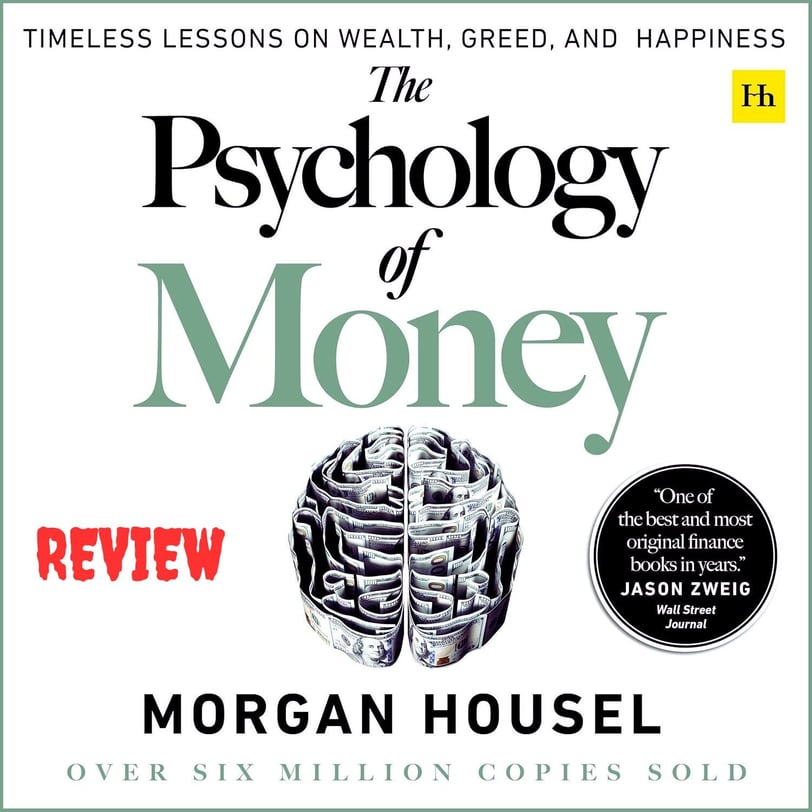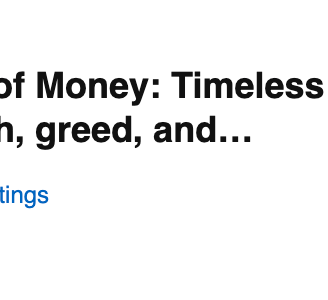10 Powerful Lessons from The Psychology of Money to Transform Your Financial Mindset
Discover the transformative insights from The Psychology of Money: Timeless Lessons on Wealth, Greed, and Happiness by Morgan Housel! This post dives deep into 10 powerful lessons that can reshape how you think about money, success, and happiness. From mastering your financial behavior to understanding the true meaning of wealth and leveraging the magic of compounding, these timeless principles will help you build a healthier relationship with money and achieve lasting financial freedom. Ready to unlock the secrets to a richer life? Dive in now!
BOOK REVIEWS
11/29/20245 min read


Money is more than numbers—it’s a deeply personal journey influenced by emotions, experiences, and psychology. In "The Psychology of Money: Timeless Lessons on Wealth, Greed, and Happiness," Morgan Housel takes readers beyond the spreadsheets to explore the human behaviors that shape our financial decisions.
Unlike traditional finance books filled with investment jargon or complex strategies, The Psychology of Money focuses on the mindset behind money management. Through 19 compelling stories, Housel reveals how our upbringing, habits, and emotions impact how we earn, save, and spend.
In this post, we’ll dive into 10 powerful lessons from the book that can transform your relationship with money. Whether you're striving for wealth, seeking balance, or simply looking for clarity in your financial life, this book offers timeless insights you can’t afford to miss. Let’s explore why The Psychology of Money is a must-read for anyone looking to master their financial mindset.
Morgan Housel’s The Psychology of Money is a treasure trove of insights that delve into how we think about wealth, success, and happiness. Below are 10 transformative lessons from the book that can reshape your relationship with money:
1. Money Success Is More About Behavior Than Knowledge
In finance, knowledge is important, but behavior is crucial. People often sabotage their financial well-being by letting emotions—fear, greed, or impatience—dictate their decisions. For instance, panic-selling during a market dip can lock in losses, while chasing high-risk investments out of greed can backfire.
Expanded Insight: Good financial behavior includes patience, discipline, and self-awareness. Even with modest income or basic investing strategies, consistently applying these behaviors can lead to long-term wealth.
Real-Life Example: Consider index fund investing. It doesn’t require technical expertise, but it demands patience and discipline to let your investments grow over decades.
2. Wealth Is What You Don’t See
Most people focus on outward displays of wealth, but true financial stability lies in assets you’ve accumulated but haven’t spent. Housel calls out the irony of people who seem rich but are actually drowning in debt because they prioritize appearances over substance.
Expanded Insight: Building wealth is about what’s left after you subtract expenses. Living below your means, regardless of your income, is one of the most underrated ways to grow your net worth.
Real-Life Example: A person earning $50,000 annually but saving $10,000 is wealthier than someone earning $200,000 but spending $210,000.
3. Compounding Is the Key to Wealth
Compounding doesn’t just help your money grow—it amplifies it exponentially over time. Small, consistent contributions can become a fortune if given enough time. The catch? You need patience and a long-term perspective.
Expanded Insight: One of the biggest mistakes is interrupting the compounding process by withdrawing investments too soon or chasing higher, riskier returns.
Real-Life Example: Warren Buffett didn’t become a billionaire until his 50s because he started investing early and let time do the work. Most of his fortune came after decades of compounding.
4. Avoid the Trap of Greed
It’s easy to get caught in the mindset of “just a little more.” However, chasing more—whether it’s money, success, or material possessions—can lead to unnecessary stress and risky decisions. Housel emphasizes the importance of finding and appreciating “enough.”
Expanded Insight: Knowing when to stop is a skill. Greed blinds people to risks, whether it’s over-leveraging investments or working endlessly at the expense of relationships and health.
Real-Life Example: Many financial collapses, like the 2008 crisis, were fueled by unchecked greed and overconfidence in “limitless” growth.
5. Risk and Luck Are Two Sides of the Same Coin
Housel highlights that financial success isn’t always about effort or skill; luck often plays a role. Conversely, risk is the price of pursuing any significant financial reward. Recognizing this balance can help you make better decisions.
Expanded Insight: By understanding the role of luck, you’ll approach success with humility. Recognizing risk will make you more cautious and prepared for setbacks.
Real-Life Example: Bill Gates admits that luck played a role in his success, such as having access to early computers. Acknowledging this doesn’t diminish his work but highlights the unpredictable factors in any success story.
Disclosure: I may receive a commission if you make a purchase using some of the affiliate links in this post, but there is no additional cost to you. You may be confident that I only suggest goods and services that I have personally utilised and firmly believe in. By supporting me with these affiliate links, you enable me to keep up my blog and give readers like you useful, free information. I appreciate your help!
6. Save Money, Even Without a Clear Goal
Saving for specific goals, like retirement or a house, is common. But Housel argues that saving for its own sake is equally important. It creates options, reduces stress, and allows for opportunities you can’t predict.
Expanded Insight: The flexibility that savings provide can be life-changing. Whether it’s taking time off work, pivoting careers, or weathering emergencies, having money saved gives you control over your choices.
Real-Life Example: During the pandemic, people with emergency funds were better positioned to handle sudden job losses or medical expenses compared to those without savings.
7. Beware of Overconfidence
Overconfidence in financial decisions often leads to unnecessary risks, like investing in volatile markets or underestimating the potential for failure. Housel warns against the illusion of control in unpredictable environments.
Expanded Insight: The best investors are those who acknowledge what they don’t know and focus on minimizing risks rather than chasing maximum returns.
Real-Life Example: The tech bubble of the early 2000s saw many investors pouring money into overhyped startups, assuming endless growth. The crash wiped out billions in wealth.
8. The Most Valuable Asset Is Control Over Your Time
Housel argues that time is our most precious resource, and financial freedom is ultimately about gaining control over how you spend it. The wealthiest individuals aren’t those who own the most but those who can use their time as they choose.
Expanded Insight: Financial independence means being able to say no to things that don’t align with your values, whether that’s an unfulfilling job or societal pressure to conform.
Real-Life Example: People who achieve financial independence often prioritize experiences, hobbies, or family over accumulating more money, finding greater satisfaction in life.
9. Tailor Your Financial Strategy to Your Personality
A cookie-cutter financial plan won’t work for everyone. Your goals, risk tolerance, and priorities should dictate your approach to saving, investing, and spending. Housel emphasizes the importance of self-awareness in financial planning.
Expanded Insight: Understanding your unique financial tendencies—whether you’re a saver or spender, risk-taker or cautious planner—can help you avoid strategies that don’t align with your values.
Real-Life Example: Some people thrive on the thrill of stock trading, while others prefer the stability of index funds or real estate investments. Knowing yourself ensures you stay committed to your plan.
10. Happiness Isn’t Always About Money
Money solves many problems, but it isn’t a guaranteed source of happiness. Housel highlights the diminishing returns of wealth on happiness and encourages readers to focus on non-monetary sources of fulfillment.
Expanded Insight: Beyond meeting basic needs, happiness comes from relationships, personal growth, and a sense of purpose. Chasing excessive wealth often leads to neglect in these areas.
Real-Life Example: Studies show that happiness levels plateau after a certain income level (around $75,000 annually in the U.S.), reinforcing the idea that more money doesn’t always mean more happiness.
Conclusion
These expanded lessons from The Psychology of Money offer profound insights into the way we think about and manage wealth. By embracing these principles, you can achieve not just financial success, but a richer, more balanced life. Implement these timeless strategies to transform your relationship with money—and ultimately, your happiness.




